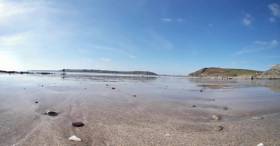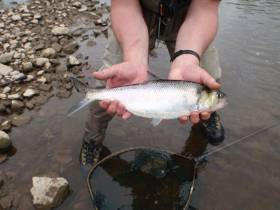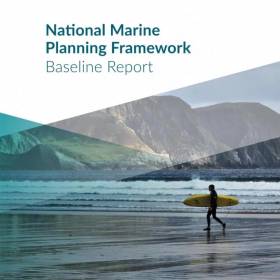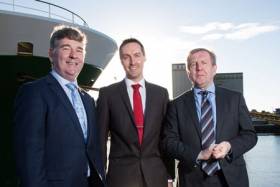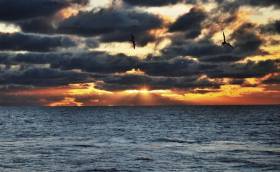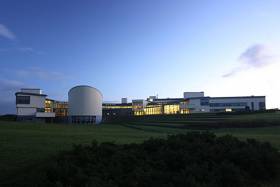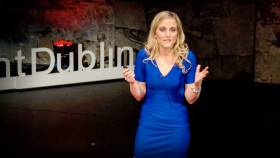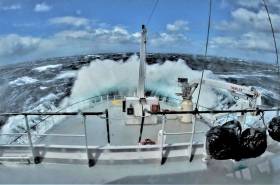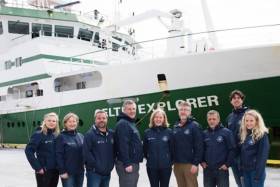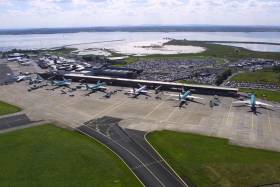Displaying items by tag: Climate Change
The Irish state is particularly aware of the threat climate change poses through sea level rises, given its island status, Tánaiste Simon Coveney has said.
As The Irish Times reports, Mr Coveney and Minister for the Marine Michael Creed are leading the Government’s participation in the 2019 SeaFest and Our Ocean Wealth Summit in Cork this week.
Ahead of the conference, Mr Coveney welcomed the leaders and ambassadors from more than 30 island states such as the Seychelles, Mauritius, Antigua, Haiti, Barbados, Fiji and Papua New Guinea.
“As a small island, Ireland understands the threats climate change poses to our friends in the Pacific, Caribbean, Atlantic and Indian oceans. It threatens their very existence,” Mr Coveney said.
“Ireland strongly believes that we can only address this challenge of a generation if we take strong climate justice approach. Emphasising the needs and realities of those who have the most to lose, yet have done least to contribute to the problem, will always be a centerpiece of our approach.”
Mr Coveney said Ireland wants to give leadership on the important issues of protecting the seas and maritime environment and countering climate change.
For more on the conference at the Ocean Summit, click here.
Ireland’s Role In Europe-Wide Research Programme To Preserve Threatened Migratory Fish
#MarineWildlife - A new project which aims to promote international action and co-operation to conserve vulnerable migratory fish species launched yesterday, Thursday 28 March.
The DiadES initiative will see 30 partners from different countries participate in this European project, with Inland Fisheries Ireland (IFI) leading out on the project in Ireland.
The project launches as migratory fish and their habitats continue to come under pressure as a result of human activity and climate change.
It will focus on fish such as shads, lampreys, salmon, trout and mullet which are known as ‘diadromous’ fish as they migrate between fresh and salt waters to reproduce or feed.
The DiadES initiative intends to improve knowledge of the ecological, economic and cultural benefits offered by these migratory species while assessing the possibility of these species changing their locations due to climate change.
It will also examine the emergence of new interactions between fish territories as a result of these relocations.
In addition to collaboration across research and knowledge sharing between countries, the project will take a global multidisciplinary approach.
It will focus on several species across different geographical areas and involve researchers in the field of natural sciences and environmental economists as well as an experienced network of fish managers.
As part of the research, a transnational interactive atlas will be produced which will outline the current distribution of diadromous fish and how they help the ecosystem. This will forecast trends in the geographical distribution of various species and look at possible redistribution of some species as a result of climate change.
The programme will also design a platform for stakeholders to explore different management strategies.
Dr Cathal Gallagher, head of research and development at IFI, said: “Throughout their life cycle, diadromous fish provide ‘ecosystem services’. This means they provide food, regulate and support the ecosystem through the nutrient cycle and offer a recreational pursuit to local communities. All of these fish generate significant ecological, economic and cultural benefits for local communities across Europe.
“We are keen to play our role in assessing and enhancing the role these fish play while also assisting them as they navigate the effects of climate change which has resulted in a reduction in their distribution.”
The DiadES project is led by the French research institute Irstea and is financed by the Interreg Atlantic Area Programme of the European Regional Development Fund (ERDF) to the value of €2.2 million.
A Public, Policy-Led Plan With Climate Change Focus: What Ireland Wants From New Marine Spatial Plan
A policy-based plan that puts climate change front and centre and steers away from privatising coastal resources is what the country wants from the State’s National Marine Planning Framework, as The Irish Times reports.
Details have been released from the recently concluded consultation on the framework’s baseline report, released in September and branded as “a key part of the process of developing Ireland’s first marine spatial plan”.
The majority of responses (53%) were related to the marine environment, with 42% of submissions raising the prospect of the plan including measures to deal with climate change.
That news is timely with fears that coastal erosion poses a threat to hundreds of communities around Ireland.
Respondents also expressed preference for a policy-driven approach over specific zoning or a hybrid of the two, and many were adamant that the plan must retain Ireland’s marine resources in public hands.
The Irish Times has much more on the story HERE.
Maynooth University Oceanographer Leads €2m Climate Change Project
#MarineScience - Marine Minister Minister Creed has welcomed the announcement of €2 million from the Marine Institute and the European Regional Development Fund for a major project on Atlantic climate change.
Led by Dr Gerard McCarthy of the ICARUS Climate Research Centre and Department of Geography at Maynooth University and guided by the goals of the Government’s national marine strategies, the international A4 Project marks a substantial investment in physical oceanography and climate change research in Ireland, and aims to improve understanding of the links between trends in Atlantic temperatures and climate change.
The project name A4 stands for aigéin (oceans), aeráid (climate) agus athrú Atlantaigh (Atlantic change).
“This funding being provided will enable Maynooth University to increase the research capacity to broaden Ireland's knowledge at a societal level, to better understand the ocean and climate change,” Minister Creed said.
“The research will contribute to national climate adaptation as well as international climate policy, supporting enhanced forecasting capabilities and contributing to adaptation and mitigation strategies and actions.
“The project is an important element underpinning implementation of the Marine Institute’s Strategic Plan 2018-2022 ‘Building Ocean Knowledge, Delivering Ocean Services’. The strategy aims to provide world-leading regional and localised forecasting outputs and services that support Ireland’s challenge in responding to changes in our ocean and climate.”
Dr McCarthy added: “Over the next five years, this project will target three areas in which substantial progress can be made including ongoing Atlantic change, sea level rise, and decadal climate prediction.
“As a small island on the edge of a large ocean, Atlantic changes impact Ireland more than any other country. When record global surface temperatures were reached in 2015, Ireland had below average temperatures due to a cool Atlantic. The reasons why Irish temperatures bucked the trend in 2015 requires a better understanding of Ireland's place in a changing climate, and for this, we need to understand the changing Atlantic.
“This important project, which I am delighted to be leading, will greatly assist in our overall understanding of this complex and fascinating area. The Atlantic’s future will differ from the rest of the world in response to a changing climate. This is primarily because the Gulf Stream system of currents, which gives Ireland its mild climate, is predicted to weaken.
“The time is ripe to build upon the observations of Ireland’s ocean made by the Marine Institute over the past decades to understand Ireland’s place on the edge of the changing Atlantic.”
The project will be supported by Prof Peter Thorne, director of the ICARUS Climate Research Centre at Maynooth University with Prof Andrew Parnell, Dr Niamh Cahill, Dr Conor Murphy, and Dr Rowan Fealy at Maynooth University. Maynooth’s lead team will utilise approximately two-thirds of a total €2 million funding with the balance utilised by co-investigators in Trinity College Dublin led by Dr Robin Edwards.
The A4 Project’s international partners are the National Oceanography Centre, UK; Scottish Association for Marine Science, UK; University of Bremen, Germany; BSH, Germany; University of Hamburg, Germany; National Center for Atmospheric Research, USA; Met Office, UK; and Tufts University, USA.
Professor Ray O’Neill, vice president for innovation at Maynooth University, said: “This major funding award reflects the global significance of the climate science research being undertaken at the ICARUS Climate Research Centre at Maynooth University.
“Enabled by this funding, Gerard McCarthy’s expertise, and that of his national and international partners, will significantly advance understanding of how Ireland and the Atlantic region more broadly will be affected by climate change in the years ahead.”
The project team will use advanced geological techniques to reconstruct Ireland’s sea level, and combine these estimates with the modern National Tide Gauge Network managed by the Marine Institute, to better understand how sea levels have been changing around Ireland and the edges of the Atlantic.
The A4 Project will also bring to Ireland the emerging field of decadal climate prediction, which will lead to improved estimates of the future climate over the period of a decade by using the predictability of the ocean.
A recent report by the Intergovernmental Panel for Climate Change on the dangers of 1.5C warming highlighted many risks including that of sea level rise. “Every nation needs to understand its own vulnerabilities to sea level rise as the effects are not the same everywhere,” Dr McCarthy said.
This project is funded by the Marine Institute under the Marine Research Programme 2014-2020, co-funded by the European Regional Development Fund.
Marine Institute Welcomes Irish Commitments To Ocean Research
The Marine Institute has welcomed Irish commitments announced at the recent Our Ocean Conference in Bali which include the provision of €25 million for a 50-metre modern research vessel to replace the RV Celtic Voyager.
“The vessel will provide critical national infrastructure to enable Ireland to address the considerable challenges of Brexit and the Common Fisheries Policy as well as climate-induced impacts on our oceans,” Marine Institute chief executive Dr Peter Heffernan said.
In addition, the Marine Institute says it has committed €2 million towards a new five-year programme of ocean and climate research.
With 50% funding from the EU ERDF scheme, the Marine Institute is running a competitive funding call to support the establishment of a principal investigator-led research team in an Irish higher education iSnstitution.
“This is a key investment to build capacity in an area of research prioritised under the National Marine Research and Innovation Strategy (2017-2021),” Dr Heffernan said.
“The research funded under this programme will deliver societally relevant knowledge aimed at better understanding the complex interactions between the ocean and climate change.”
Minister Creed also announced the continued commitment to the Environmental Educational module of Ireland’s Green Schools programme, and the continued support of the Clean Coasts programme.
“These programmes aim to build on Ireland’s marine and maritime heritage by increasing awareness of the value, opportunities and social benefits of our ocean wealth and identity, further supporting the Marine Institute’s Explorers Education Programme,” Dr Heffernan said.
Other announcements by Ireland include the provision of €10m to the local authority sector in Ireland to aid in the establishment of four Climate Action Regional Offices (CAROs) and €1m over a five-year period (2019-2024) towards a new programme of ocean and climate research.
The Marine Institute also welcomes commitments announced by the European Commission which include €300 million for EU-funded initiatives for projects to tackle plastic pollution, make the ‘blue economy’ more sustainable and improve research and marine surveillance.
Last Chance To Apply For Post-Doc Research Roles With Marine Institute
#Jobs - This Thursday 16 November is the closing date for two post-doctoral research roles with the Marine Institute.
Based at the Marine Institute’s facility in Newport, Co Mayo, the WATexR (Climate JPI) Project requires a post-doc for a period of up to 34 months, who will have a central role in implementing the research project along with the project team.
Meanwhile, at the institute’s headquarters in Oranmore, Co Galway, a data analyst is sought to work on the Co-development of Climate Services for Adaptation to Changing Marine Ecosystems (CoCliME) project.
Applications for both positions close at noon on Thursday 16 November.
#MarineScience - A talk on how pollution is changing the chemistry of the seas around Ireland has been selected as a featured video by TED.com.
The talk by Irish marine scientist and Fulbright Scholar Dr Triona McGrath discusses the process of ocean acidification, caused by the absorption of carbon dioxide in the atmosphere into the world’s oceans.
A post-doctorate researcher at NUI Galway, Dr McGrath presented her talk on 6 February last year to a local audience at TEDxFulbrightDublin, organised by the Fulbright Commission in Ireland and Fulbright alumnus Dr Lorcan Walsh.
Dr McGrath’s team monitors levels of carbon dioxide in Irish marine waters to determine the level of carbon in the ocean and subsequent increase in ocean acidity.
Along with her colleagues, she published the first rates of ocean acidification for Irish offshore waters and the first baseline dataset of carbon parameters in Irish coastal waters.
This data is crucial for our understanding of the future health of our oceans, and can provide information to determine the impacts of ocean acidification on marine ecosystems.
In her talk, Dr McGrath states: “Ocean acidification is a global threat ... The rate of acidification is ten times faster than any acidification in our oceans for over 55 million years, our marine life has never experienced such a fast rate of change before ... There was a natural acidification event millions of years ago, it was much slower than what we're seeing today, this coincided with the mass extinction of many marine species.”
She also warns: “We will see acidification, we have already put too much carbon dioxide into the atmosphere ... but we can slow this down, we can prevent the worst case scenario. The only way of doing that is by reducing our carbon dioxide emissions.”
As a Fulbright Scholar, Dr McGrath visited the Scripps Institution of Oceanography in San Diego in 2013 to develop her analytical skills in ocean carbon chemistry.
A researcher in ocean climate change since 2008, her latest research project started in February 2017 and for the next four years she will work with colleagues to further develop ocean acidification research through the continuation of an ongoing time series in the Rockall Trough and the determination of seasonal and inter-annual variability of the carbon system in coastal waters.
Dr McGrath has a PhD in Chemical Oceanography and a BSc in Marine Science from NUI Galway.
#ClimateChange - Preliminary results from the recent ‘health check’ of the Atlantic Ocean suggest a greater penetration of manmade chlorofluorocarbons (CFCs) further into the deeper ocean since 20 years ago.
As previously reported on Afloat.ie, an Irish-led international team of marine scientists from six countries set out from Newfoundland on 27 April on board the RV Celtic Explorer, to survey a transect of the Atlantic last measured two decades ago and investigate the impact of climate change on the deep ocean.
Explaining the team’s findings, Dr Evin McGovern of the Marine Institute and principal investigator on the GO-SHIP A02 survey said: “Although these chemicals have been phased out, they remain in the atmosphere and enter the ocean, where over time, they travel to the deep ocean.
“We measure the CFCs to tell the age of the water masses in the deep ocean and this helps us assess the uptake of fossil fuel carbon from the atmosphere and penetration into the deep ocean.”
The survey formed part of the Global Oceans Ship-Based Hydrographic Investigations Programme (GO-SHIP), which carries out systematic and global surveys of select hydrographic sections, through an international consortium of 16 countries and laboratories.
This was the first GO-SHIP survey to involve such a level of collaboration, with scientists from 10 leading universities and research institutes representing six countries.
Canadian Ambassador to Ireland Kevin Vickers visited the RV Celtic Explorer to meet the team in Galway following their arrival on Monday 22 May.
“This survey is a wonderful example of the Galway Statement in action as well as the longstanding collaboration on marine research between Ireland and Canada,” he said.
Marine Institute chief executive Dr Peter Heffernan added that the expedition’s scientists “are contributing to addressing some of the biggest questions for society and our interaction with our planet.”
Find out more about the survey on the Scientists@Sea blog, where the GO-SHIP team aboard the RV Celtic Explorer recorded their work and experiences.
Six Countries Team Up To Take Temperature Of The Atlantic
#MarineScience - An international team of marine scientists from six countries are currently sailing on Ireland’s national research vessel RV Celtic Explorer on a transatlantic voyage to study the impact of climate change on the ocean.
Departing from St John’s in Newfoundland on Thursday 27 April — after launching the miniature yacht Lancer a few days previously — and due to arrive in Galway on 23 May, the Marine Institute-led team of experts are surveying a transect of the Atlantic Ocean last surveyed 20 years ago to investigate carbon dioxide levels in the ocean.
The survey is essential to understand and project how carbon dioxide emissions are accumulated in the oceans and the atmosphere, as well as its effects on the acidification of the ocean.
The survey is part of the Global Oceans Ship-Based Hydrographic Investigations Program (GO-SHIP), which carries out systematic and global surveys of select hydrographic sections, through an international consortium of 16 countries and laboratories.
This is the first GO-SHIP survey to involve this level of collaboration with scientists from ten leading universities and research institutes representing six countries joining the survey.
Marine Institute chief executive Dr Peter Heffernan said: “The Marine Institute is proud to lead this truly international collaboration. This GO-SHIP A02 survey is a very real example of the Galway Statement in action: working together to better understand and increase our knowledge of the Atlantic Ocean and its dynamic systems, and promoting the sustainable management of its resources.”
The Galway Statement, signed at the Marine Institute 24 May 2013, launched the Atlantic Ocean Research Alliance between the EU, Canada and the USA.
The survey is co-ordinated by the Marine Institute and NUI Galway with research partners in Dalhousie University and Fisheries and Oceans, Canada; University of Exeter, United Kingdom; GEOMAR, Germany; Woods Hole Oceanographic Institution and Columbia University, USA; and Aarhus University, Denmark.
“Ship-based surveys are still the only way to collect the best quality measurements of fundamental physical, chemical and biological properties known as Essential Ocean Variables,” said Dr Evin McGovern of the Marine Institute and principal investigator on the GO-SHIP A02 survey.
“Although technology has provided many new methods to collect ocean measurements, there’s really no substitute for going out on the ocean on a research vessel.
“We can use satellite technology to look at certain properties the ocean surface and can deploy autonomous argo floats to take some measurements to depths of 2000, but we need to carry out ocean surveys that can measure to get a complete picture of the chemistry of the ocean at different depths up to 5,000m.
“The transect we are surveying is a really dynamic area of the Atlantic for heat transport and carbon uptake and is hugely important to informing our understanding of our global climate and how the ocean regulates our climate,” added Dr McGovern.
“The Northwest Atlantic is one of the world’s largest sinks of carbon dioxide and despite progress in our understanding there’s still a huge lack of data as it relates to climate change’s impact on the ocean and what that means for the economy and society,” said Brad de Young, a professor of physics and physical oceanography at Memorial University, Newfoundland and an Ocean Frontier Institute researcher.
“Improving our scientific understanding and developing strategic and effective solutions for safe and sustainable ocean development requires sharing of expertise, international co-operation and exchange of data and best practices. And that’s what this voyage is all about,” adds Doug Wallace, Canada Excellence research chair at Dalhousie University.
Climate Change Prompts New Coastal Erosion & Flooding Plan
#CoastalNotes - Coastal defences and protections against flooding are outlined in a new Department of Transport plan to prepare Ireland for future climate change, as The Irish Times reports.
The draft consultation report, Developing Resilience to Climate Change in the Irish Transport Sector, details measures such as coastal flood defences at Shannon Airport and the railway line at Rosslare Harbour, the latter of which is inching ever closer to the cliff on the eroding shoreline.
As previously reported on Afloat.ie, the East Coast line suffered significant damage north of Wicklow town during last month’s Storm Angus.
Predicted rises in temperatures and sea level over the next century are expected to bring more of such storms, with heavier rainfalls and an increased risk of flooding and landslides in prone areas.
All of this has prompted the new plan to identify key remedial works for future-proofing the country’s transport infrastructure.
The Irish Times has more on the story HERE.



























